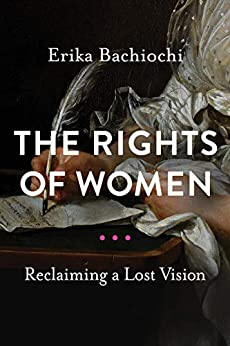Catholic Medical Quarterly Volume 71(4) November 2021
Book Review
The Rights Of Women:
Reclaiming a Lost Vision
by Erika Bachiochi. University of Notre Dame
Press
Reviewed by Dr Pravin Thavasathan
 The
author is a legal scholar. The most salient point made in this superb work
is that there is a very real difference between the vision of the early
feminist movement and that of most contemporary feminists. The early
feminists remind one of the brave women of Afghanistan as they campaign
for better education, health and protection for women. In contrast,
contemporary feminists have lost their way. In their quest for sexual
licence and abortion "rights", they have betrayed their own founders.
The
author is a legal scholar. The most salient point made in this superb work
is that there is a very real difference between the vision of the early
feminist movement and that of most contemporary feminists. The early
feminists remind one of the brave women of Afghanistan as they campaign
for better education, health and protection for women. In contrast,
contemporary feminists have lost their way. In their quest for sexual
licence and abortion "rights", they have betrayed their own founders.
The author writes as a supporter of the early feminists. There is no contradiction, she says, in being pro-woman and pro-life. While she agrees with contemporary feminists in their quest for equal rights, she documents the way in which they have departed from their own cause.
The author particularly focuses on the work of the early feminist Mary Wollstonecraft. We now know her for her colourful personal life and for being the mother of Mary Shelley. Shelley was famously interested in unethical science. Her mother saw that there is a need for both men and women to live virtuous lives in order to ensure equality of the sexes. She was against abortion and infanticide because apart from being destructive of human beings, they led to a mentality that exploited women. Someone like Harvey Weinstein, zealous promoter of Planned Parenthood, comes to mind.
Contemporary feminists, at least the best known ones, have rejected morality in their quest for sexual licence. Their vision may be liberating for some but not for many: think of the number of men who have walked away from pregnant women, regarding the situation as the woman's problem. He is likely to argue that if she chooses to keep the baby, that is her choice and not his responsibility. Abortion undermines the rights of women. Always.
Compare contemporary feminists to the early feminists who pursued virtue and sexual restraint. The second wave feminists woke up to the fact that the sexual revolution had harmed women. Sadly, it would appear that their successors want more of the same. Much more. Abortion is no longer to be regarded as a necessary evil but as something to be celebrated. What is needed, they say, is more and better government programmes. In other words, even more access to abortion.
The author reminds us that there is no way for women to flourish when it is proposed that there is some kind of inherent conflict between a mother and her unborn child. She is also surely right to say that one of the best ways to make a nation pro-life is for that nation to have strong, healthy marriages.
The purpose of freedom is for human flourishing, not flouting the virtues, as this excellent work so clearly demonstrates.
